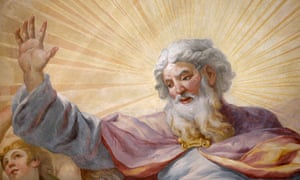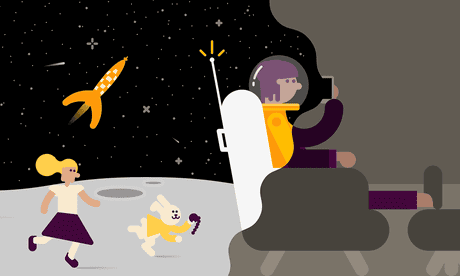God seldom features in fiction. Having been dispensed with by Enlightenment philosophes around the time the first novels were emerging, he must have seemed irrelevant. The novel was new and God was old. Even clergy, who were facing an existential crisis of great literary potential, seemed infra dig to most novelists. There were new professions to explore: revolutionary, businessman, detective.
And it wasn’t enough that God was no longer necessary – neither was our need for spiritual nourishment. For the first time, and for most people, it was possible that life on Earth was better than it was in heaven.
The church remained a social setting in 19th-century novels, but the local vicars were more often comical, sometimes absurd, almost always ineffectual figures. Over the next century, if clergy appeared at all, they were mostly embodiments of the death of God. More recently, many novelists have gone back to the Gospels and appropriated aspects of the Jesus story. But rather than any serious attempt to understand his centrality to our cultural inheritance, they tend towards a kind of defrocking – mocking him as a credible spiritual leader, a trickster that finally needs exposing, his story the moment when it all went wrong.
In my new novel As a God Might Be, Proctor McCullough fears the possibility of an authentic encounter with God; not a feeling or vision, but a genuine meeting. What happens then, he wonders. Claim it as true and the world will think him mad. But that doesn’t mean it isn’t true. Yes, God does make an appearance – sort of. Whether it is really him, we can only wonder.
Below are 10 fictions that deal with the presence or absence of God. To keep offence to a minimum, I’ve chosen novels that fall within my own, broadly Christian, tradition. The novelists themselves range from the devout to the tormented to atheist.
1. The Gospels translated by Richmond Lattimore
Blasphemy #1: In choosing Lattimore’s secular translation (no columns, chapters or verses), I count this as a work of fiction rather than revealed truth. Jesus as incarnate God is complicated, irritable, demanding, charismatic, much like Yahweh in the Old Testament. By the end of Gospels, he has become a man with a deeper confidence in his destiny and yet more of a mystery to us. It is not surprising that Christians who lose their faith in God seldom lose their faith in Jesus.
2. The Brothers Karamazov by Fyodor Dostoevsky
The first “God is dead” narrative, and Ivan Karamazov is its storyteller. In the chapter Mutiny, he explains to Aloysha, his younger brother and novice monk, why he is returning his ticket to be present at the end of time when all those who have suffered are finally redeemed. Focusing on reports of the torture and murder of children with a kind of ecstatic glee, he asks Aloysha whether he himself would make a world that ends with universal love at the cost of a single child’s suffering. It is the question all believers must ask themselves and then live with the answer.
3. Roger’s Version by John Updike
Roger Lambert, former Methodist minister, ageing theology professor, a disciple of Karl Barth, is a curmudgeon, adulterer and consumer of pornography. Dale Kohler, is a graduate student, evangelical Christian and computer scientist. The latter thinks he can discover God through mathematics.
4. Earthly Powers by Anthony Burgess
At the centre of this 800-page argument with Catholicism is Carlo Campanati, a priest who becomes cardinal who becomes pope (God’s representative on Earth), and in between times beats up a Malaysian businessman, sets about Mussolini’s blackshirts, and then tortures a Nazi officer – all before writing what is clearly Burgess’s version of Vatican II, a liberal, welcoming, love-filled entreaty to bring all of Christianity back together. He is one of the few characters in literature whose size and moral certainty mean they can take on the powers of darkness with both rigorously argued sermons and great fleshy fists.
5. The Time of the Angels by Iris Murdoch
This a kind of “death of God” soap opera. Seven characters struggle, in varying degrees of torment, to find meaning in a godless world. Such is the existential gloom – most of the action takes place in an old rectory on an urban wasteland surrounded by fog – that even being decent is a struggle. Murdoch seems to be saying that if the world dispenses altogether with God, the void will be taken up by malevolent angels. On a separate note, she also seems to say that if we dispense with God individually, we will be forced to listen only to Tchaikovsky. You’ve been warned.

6. The Last Temptation of Christ by Nikos Kazantzakis
Blasphemy #2: There is something elemental in this novel about the life of Jesus that is absent in the Gospels, and I would make this a set text for anyone studying the nature of Jesus, as the fullest expression of the journey from carpenter to cross – from man to God. The last section of the novel, so reviled by fundamentalist Christians, is one of the most mysterious, imaginative, enthralling and moving passages in all literature.
7. Omensetter’s Luck by William H Gass
There is wild precision in Gass’s rendering of the ravings of Reverend Jethro Furber – a kind of devil figure to Omensetter’s grace-touched goodness. Furber is a midwestern Iago – he needs no real reason for evil. In the end, like the Grand Inquisitor in The Brothers Karamazov, Furber offers Omensetter a deal. It seems that if you can’t destroy love you can still run it out of town.
8. The Spire by William Golding
Visions from God often inspire us to build. Whether it’s to reach God or contain him, I don’t know. And like Dean Jocelin’s new spire, we tend to do so without foundations. Who needs building regulations with God’s instruction? Written in Golding’s sparest prose, this is a novel about spiritual and material hubris. Let’s remember it was the cost of rebuilding St Peter’s that led to the Reformation.
9. Laurus by Eugene Vodolazkin
A picaresque magical realist novel set in 15th-century Russia, where holy fools talk like Californian surfer dudes; the end of the world is (very) nigh, and yet events from the next five centuries of break through into the narrative; and where ascetic starvation and sleeping out in a cemetery during a Russian winter doesn’t kill you. Moving, intense, and often funny, the novel’s great achievement is taking us inside the medieval world of faith, where God and holiness pervades all things.
10. A Good Man Is Hard to Find by Flannery O’Connor
Blasphemy #3: Can it be true that towards the end of this extraordinary short story, for a brief moment, God incarnates himself in a prattling, selfish grandmother? That for some reason God decides to become a direct witness to an individual’s suffering, but not of the woman whose family has just been murdered and is about to be killed herself, but of the psychopath, who in this moment realises his distance from God. There are few more moving lines in all literature than those spoken at the very end by grandmother; few more moments more devastating when we realise it will make no difference. If God is dead it’s because the Misfit shot Him.
- As a God Might Be by Neil Griffiths is published by Dodo Ink, priced £12.99. It is available from the Guardian Bookshop for £11.04 including fre....
As 2019 begins…
… we’re asking readers to make a new year contribution in support of The Guardian’s independent journalism. More people are reading and supporting our independent, investigative reporting than ever before. And unlike many news organisations, we have chosen an approach that allows us to keep our journalism accessible to all, regardless of where they live or what they can afford. But this is only possible thanks to voluntary support from our readers – something we have to maintain and build on for every year to come.
Readers’ support powers The Guardian, giving our reporting impact and safeguarding our essential editorial independence. This means the responsibility of protecting independent journalism is shared, enabling us all to feel empowered to bring about real change in the world. Your support gives Guardian journalists the time, space and freedom to report with tenacity and rigor, to shed light where others won’t. It emboldens us to challenge authority and question the status quo. And by keeping all of our journalism free and open to all, we can foster inclusivity, diversity, make space for debate, inspire conversation – so more people, across the world, have access to accurate information with integrity at its heart. Every contribution we receive from readers like you, big or small, enables us to keep working as we do.
The Guardian is editorially independent, meaning we set our own agenda. Our journalism is free from commercial bias and not influenced by billionaire owners, politicians or shareholders. No one edits our editor. No one steers our opinion. This is important as it enables us to give a voice to those less heard, challenge the powerful and hold them to account. It’s what makes us different to so many others in the media, at a time when factual, honest reporting is critical.
















Pentru a putea adăuga comentarii trebuie să fii membru al altmarius !
Alătură-te reţelei altmarius